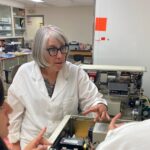The prairie province’s agricultural innovation landscape is witnessing a transformative alliance as three key organizations join forces to propel Saskatchewan’s agri-food technology sector to new heights. The Saskatchewan Food Industry Development Centre, Cultivator powered by Conexus, and Economic Development Regina announced a strategic partnership Monday aimed at nurturing agricultural technology startups through an expanded incubator program.
“Saskatchewan is already a global agricultural powerhouse, but the real opportunity lies in developing the technology that will define farming’s future,” said Jordan McFarlen, Business Incubator Manager at Cultivator, during the partnership announcement in Regina. “This collaboration creates a seamless pathway for agri-food innovators to access specialized resources at every stage of development.”
The partnership will significantly enhance the province’s innovation ecosystem by connecting early-stage companies with comprehensive support systems. Food Centre President Dan Prefontaine emphasized that this coordinated approach addresses a critical gap in the development pipeline for agricultural startups.
“We’ve seen brilliant innovations struggle because entrepreneurs didn’t have access to the right facilities or expertise at the right time,” Prefontaine noted. “Now, companies developing novel processing methods or food products can move from concept testing at Cultivator to pilot-scale production at our facilities without losing momentum.”
The initiative builds upon Saskatchewan’s already impressive agricultural credentials. The province accounts for nearly 40 percent of Canada’s cultivated farmland and produces approximately one-third of the nation’s grain. This natural advantage, combined with a growing technology sector, positions Saskatchewan uniquely in the global agri-food innovation race.
Economic Development Regina’s involvement ensures that successful ventures will have support scaling their operations within the region. President and CEO Chris Lane explained that the partnership creates natural alignment between research, development, and commercialization phases.
“When we coordinate our resources, we create a far more powerful ecosystem than any one organization could provide alone,” Lane said. “Companies graduating from these incubators will be primed to establish manufacturing and processing operations here, creating high-value jobs and economic diversification.”
The program is already gaining attention from potential participants. Saskatoon-based entrepreneur Megan Adams, who is developing plant-based protein ingredients, called the partnership “exactly what Saskatchewan’s innovation community needs.”
“As someone navigating the complicated path from concept to market, having access to specialized facilities and mentorship specifically designed for food technology is invaluable,” Adams told CO24 Business. “The costs and complexity of scaling food innovations are enormous barriers that this program directly addresses.”
Saskatchewan’s agricultural technology focus comes at a pivotal moment as global food systems face unprecedented challenges from climate change, supply chain disruptions, and growing food security concerns. The province’s well-established agricultural base provides a natural testing ground for innovations that could have worldwide impact.
Industry analysts suggest that Saskatchewan’s emphasis on agri-food technology aligns perfectly with emerging investment trends. The global agricultural technology sector attracted over $15 billion in venture capital during 2022, demonstrating strong market interest in food system innovations.
The partner organizations expect to announce specific funding opportunities and program details in the coming weeks, with the first cohort of participants anticipated to begin the program in early 2024. This initiative represents a significant step in Saskatchewan’s ongoing transition from primarily resource extraction to value-added production and technology development.
As our global food systems face unprecedented challenges, the question remains: Could Saskatchewan’s collaborative approach to agricultural innovation provide a template for other regions seeking to transform their traditional farming economies into technology-driven powerhouses?

























